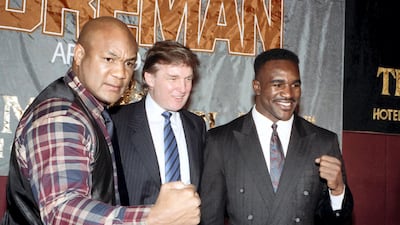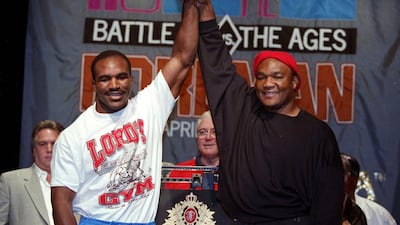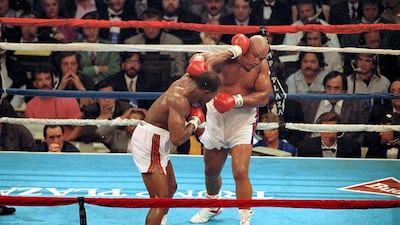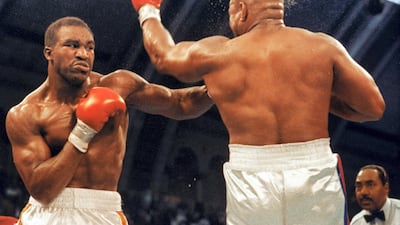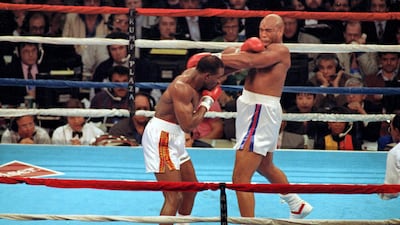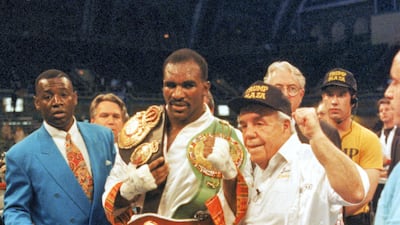When news emerged in 1987 that George Foreman was contemplating a comeback, few believed it was no more than a money-making gimmick. Many predicted it would end in embarrassment.
Foreman’s place in the pantheon of heavyweight champions was secured decades earlier courtesy of legendary dust ups with fellow greats Joe Frazier, Ken Norton and Muhammad Ali. A return to prizefighting after a decade as an evangelical pastor had many a purist shaking their head in disbelief.
Then photos surfaced of Foreman’s portly frame in the ring against a journeyman named Steve Zouski, the former champion’s massive paunch protruding over the waist band of the same red and blue trunks he had worn years before.
Few were impressed. “This is pathetic,” remarked NBC boxing commentator Dr Ferdie Pacheco at the time, echoing the thoughts of many a respected pundit. “It shouldn’t be allowed.”
A string of victories against boxers whose only claim to fame was that they shared a ring with the once-great Foreman did little to enhance comeback credibility. Sure, Foreman was knocking people out, but these were against fighters who were barely fit to lace the great man’s gloves.
That all changed on January 15, 1990, when Foreman scored a victory over Gerry Cooney, a boxer good enough to share 18 championship rounds with Larry Holmes and Michael Spinks, in New Jersey. Billed as “The Preacher vs The Puncher”, Foreman knocked Cooney out in two rounds. Suddenly, the comeback was given legitimacy.
While Foreman was slowly building, the man of the moment was Evander Holyfield. The former world cruiserweight champion did what Mike Tyson failed to do and knocked out James “Buster” Douglas inside three rounds to become WBA, WBC and IBF heavyweight champion in October 1990.
Holyfield delayed a potential fight with Tyson, instead agreeing to face Foreman. Foreman was a perfect 24–0 on the comeback trail, with 23 of his wins coming via knockout, when he lined up opposite Holyfield at New Jersey’s Convention Centre on April 19, 1991 in what was billed as "A Battle For The Ages".
Few gave the rotund 42-year-old Foreman a chance against a 28-year-old Holyfield who looked as if chiselled by the gods. Holyfield's manager, Don Duva, mocked Foreman's weight pre-fight, infamously stating that the bout should be called "The Real Deal" vs "The Big Meal". "Some people say George is as fit as a fiddle. But I think he looks more like a cello,” Duva teased.
But when the bell rang, Foreman confounded middle age and a conventional wisdom to rattle Holyfield, who would have to muster up every ounce of the warrior spirit that would define his career.
One round – seven – will go down in boxing history, such was the ebb and flow of the fight. With Holyfield seemingly in control, peppering the old warrior with jabs, he was suddenly struggling to unscramble his senses after Foreman connected with a thunderous right hook. Holyfield rebounded and proceeded to land a 15-second, multiple punch combination that staggered Foreman.
Though Holyfield's barrage of punches seemed to tire Foreman, he nevertheless was able to survive the round without going down. The three minutes of mayhem was named "Round of the Year" by The Ring magazine.
As if to prove a point to the young buck, Foreman refused to sit in his corner in between rounds, to show he was not tiring; he had plenty left in the tank.
Holyfield took Foreman's best punches over 12 brutal rounds, proving his was one of boxing's most durable chins, and came back with plenty of his own, and was awarded a unanimous verdict by the judges.
"If you can live, you can dream," Foreman said. "The only thing that stopped me was the fine jaw of Evander Holyfield. But if I had to lose, I'm glad I lost to a fine gentleman. There's no dignity lost.”
"I couldn't just run him over," Holyfield said in a post-fight news conference. "He hits hard and was able to move me around more than I wanted to."
Though the records will show a third loss in 72 pro bouts, Foreman had won over the sceptics. Two years later, he would go on to reclaim the heavyweight title he had lost to Ali 20 years earlier, becoming the division's oldest champion at age 45.
"I didn't get it on points, but I made a point," Foreman concluded.
